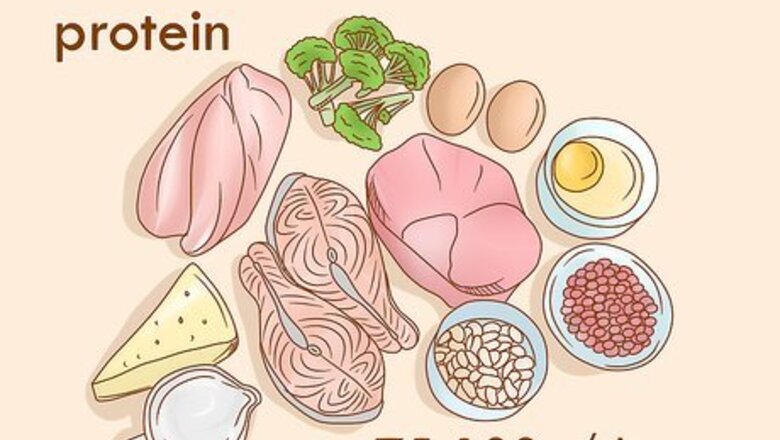
views
Altering Your Diet
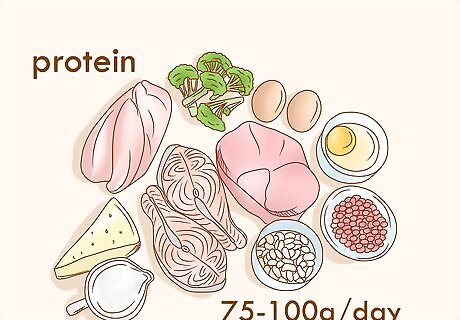
Amp up your protein intake to 75 to 100 grams per day. Eat protein-rich meats, legumes, grains, and veggies to repair your muscles—particularly your breast and uterine tissue. Extra protein before and during pregnancy will help your body build new body tissue for your baby. If you eat meat, stick to lean sources of protein like ground beef, chicken, turkey, fish (low-mercury types), eggs, yogurt, and cheese. Plant-based sources of protein include tofu, tempeh, seitan, beans, lentils, peas, quinoa, wild rice, nuts, brussels sprouts, and chia seeds.

Eat no more than 12 oz (340 g) of fish a week to avoid ingesting mercury. Limit the amount of seafood you eat to cut back on how much mercury you’re taking in. Studies have shown that large amounts of mercury can cause birth defects. However, you can still enjoy a 4-oz (113 g) serving of low-mercury fish 2 to 3 times a week. Low-mercury fish include anchovy, black sea bass, cod, salmon, scallops, shrimp, sole, tilapia, freshwater trout, and whitefish. If you’re already pregnant or trying to get pregnant, you should especially avoid high-mercury fish like king mackerel, marlin, orange roughy, tuna, shark, and swordfish.
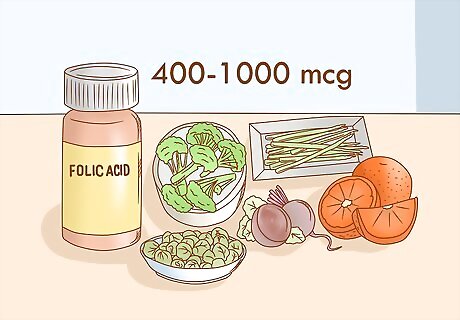
Consume 400 to 1,000 mcg of folic acid every day. Talk to your doctor about taking a prenatal vitamin containing folic acid or focus on foods that have this vital nutrient. Dark green veggies (like broccoli, brussels sprouts, and leafy greens), asparagus, citrus fruits, eggs, beets, and legumes will help you meet the daily recommended intake. Folic acid will help prevent neural tube defects (that is, birth defects affecting the brain, spine, or spinal cord). If you suspect you’re not getting enough folic acid, talk to your doctor about taking a folic acid supplement at least 1 month before you plan to conceive.
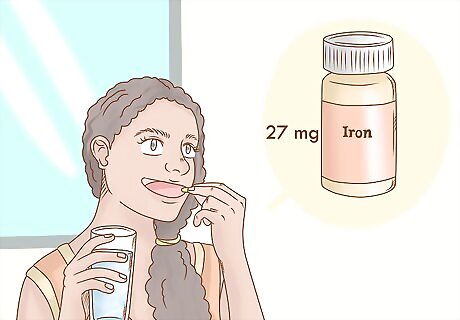
Take in 27 milligrams of iron per day to prevent anemia. Red meat, fish, chicken, egg yolks, and leafy greens like collards, kale, and spinach are all good choices to help you meet your daily recommended intake. Iron helps form red blood cells, which is necessary for your body to produce extra blood for you and your future baby. If you have dietary restrictions that prevent you from getting enough iron from food, talk to your doctor about taking an iron supplement.
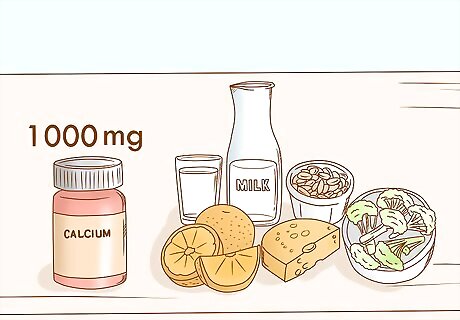
Meet the daily recommended amount of 1,000 mg of calcium. Your future baby’s bones, teeth, muscles, heart, and nervous system will benefit from lots of calcium-rich foods. Milk, cheese, yogurt, tofu, nuts, broccoli, okra, bok choy, and kale are pack a punch of calcium. If allergies or dietary restrictions prevent you from getting calcium from food, talk to your doctor about taking a supplement. If you have trouble digesting lactose, look for calcium-fortified nut milks and juices.
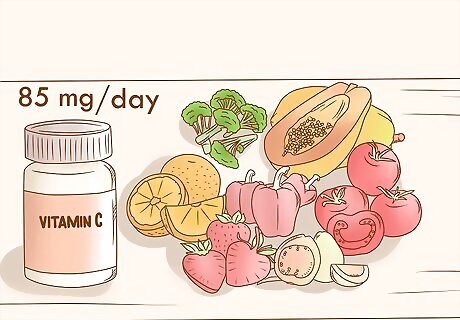
Get 85 mg of vitamin C per day to strengthen your immune system. It’s common for pregnancy to weaken your immune system, which makes sense because your body is busy building a baby! Sweet red peppers, tomatoes, oranges, broccoli, guava, strawberries, and papaya are all excellent sources of this necessary nutrient. Vitamin C will not only keep you strong and healthy, but it will help develop your future baby’s teeth and bones. Avoid taking in more than 2,000 mg of vitamin C every day.
Get at least 200 to 300 mg of DHA every day. DHA is a particular type of omega 3 fatty acid that helps build your future baby’s brain, eyes, and nervous system. Poly-unsaturated fats like walnuts, sunflower seeds, and flax seeds (or oil) all contain DHA. Cold-water fish like salmon, tuna, sardines, anchovies, and herring contain DHA, but due to their mercury content, it may be safer to take a purified fish oil supplement (with your doctor’s approval).
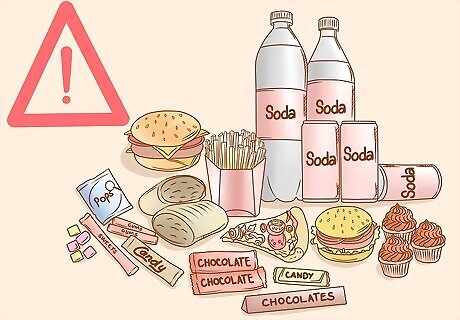
Ditch processed foods for whole foods for maximum nutrition. Make an effort to eat whole foods when you’re cooking at home or dining out. Stay away from frozen or packaged heat-and-eat meals, soda, candy bars, packaged sweets, white bread, and sugary cereals. You’re going to be eating for 2 soon, so focus on feeding yourself and your baby the highest-quality whole foods possible! When dining out, avoid fast food or chain restaurants and don’t be afraid to ask your server about whether or not a dish contains preservatives or other processed ingredients. Studies have shown a link between autism and a preservative (called PPA) found in overly processed or packaged foods.

Take prenatal vitamins if your doctor recommends you do so. With the approval of your doctor, consider taking prenatal vitamins to make sure you’re getting all of the nutrients you and your future baby need. Most prenatal vitamins contain folic acid, iron, and calcium, vitamin D, and a range of other vitamins and minerals. Studies have shown that taking prenatal vitamins can reduce the risk of your child being born with autism spectrum disorders.

Limit your caffeine intake to 200 mg per day to increase your fertility. Decrease the amount of coffee or caffeinated tea you drink so you don’t go over 200 mg per day. Studies have shown that excessive amounts of caffeine can make it harder to get pregnant. Furthermore, too much caffeine can lead to dehydration and decrease your fertility. Taking in over 200 mg of caffeine a day while you’re pregnant increases your blood pressure and heart rate and raises the risk of low-birthweight and miscarriage. A standard cup of coffee contains 95 mg of caffeine, so limit yourself to 2 cups a day. Black tea typically contains around 50 mg of caffeine, so don’t drink more than 3 to 4 cups per day.
Making Lifestyle Changes

Stop drinking alcohol to ensure a healthy pregnancy and baby. Cutting out alcohol as soon as possible will make it easier to get pregnant and lessen the chance of having a miscarriage. You won’t have the time or energy to go out and party when the baby comes, so you might as well get sober now! There’s a common belief that drinking a little alcohol while pregnant is okay, but it can cause your baby to be born with intellectual disabilities, behavioral issues, and facial and heart defects.

Quit smoking for your own health and the health of your future baby. If you’re trying to conceive, it’s important to quit smoking as soon as possible. Smoking not only depletes your body of essential nutrients (like vitamin C), but it increases the risk of pregnancy complications and affects your health and the health of your future baby. Use lozenges, gum, or patches to wean your body off of nicotine. Use mindful meditation to deal with mood swings that might occur during nicotine withdrawal. If both you and your partner smoke, make a pact to quit together so you both stay accountable.
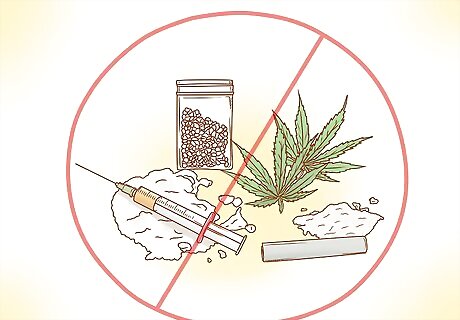
Stay away from recreational drugs. Any drugs that you take during pregnancy can potentially get into the baby’s body through your bloodstream. Many recreational drugs, such as cocaine, heroin, methamphetamines, and marijuana, can cause serious harm to your baby or increase your chance of having a miscarriage or a premature delivery. For your own health and the health of your baby, avoid using any drugs before or during your pregnancy. If you struggle with dependence or addiction to any drug, talk to your doctor. They can help you find the best and safest way to quit.

See your doctor for blood tests, vaccinations, and a complete checkup. Make an appointment with your doctor to get a blood test and, if necessary, get caught up on your vaccinations. Discuss your medical history and your family’s medical history with your doctor so they can help you prepare for pregnancy and address any genetic risk factors that might be passed on to your baby.Tip: When you’re over 30, the risk that your baby may have a chromosomal abnormality increases slightly. During your pregnancy, ask your doctor about doing a prenatal cell-free DNA (cfDNA) screening. This test involves taking a sample of your blood to detect any possible abnormalities in your baby’s DNA, such as Down syndrome or trisomy 13. Depending on the results, your doctor may suggest doing more invasive tests, like amniocentesis. If you have long-term conditions like asthma or diabetes, it’s important to get those issues stabilized before you get pregnant. Be sure to tell your doctor about any herbal supplements you take because some (like goldenseal, dong quai, red clover, and saw palmetto) can affect the health of your baby.
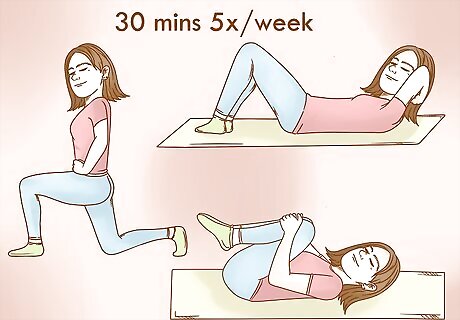
Get 30 minutes of exercise at least 5 days per week. If you aren’t currently active, get moving! It doesn’t have to be anything intense—walking, dancing, swimming, and light aerobics will all help prep your body for your baby. Starting a regular exercise routine before getting pregnant can help you deal with all the changes your body will be going through. Add in 2 days of total-body resistance training to strengthen your legs, core, and upper body. That way, you’ll be ready to carry around the baby in your belly and, later on, in your arms! If you currently perform vigorous exercise most days of the week, cutting back the duration and intensity of your workouts will make it easier to conceive. If you need help getting motivated, look to local gyms to see if they offer prenatal yoga, pilates, or aerobics classes.
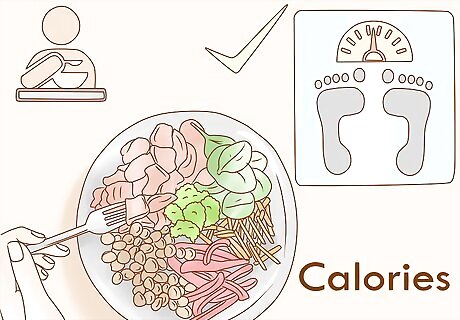
Eat more or fewer calories to achieve a normal weight, if necessary. Being overweight can complicate your pregnancy, resulting in high blood pressure, diabetes, miscarriage, and stillbirth. It can also affect the delivery process, making it more likely that you’ll need a cesarean birth. On the other hand, being underweight makes it harder to get pregnant and, when you do, there’s a higher risk of miscarriage or birth defects. If your BMI is less than 18.5, actively take in an extra 400 to 500 calories per day to gain weight and ease up on your exercise routine. If your BMI is over 24.9, cut 400 to 500 calories out of your daily intake to lose weight and amp up your exercise routine. If you’re overweight and currently pregnant, avoid trying to lose weight and focus on taking in enough calories for both you and your baby.

Try mindful meditation to reduce stress and foster a positive mindset. Start a daily meditation practice to keep your stress levels low and your positivity high. Stress can cause premature birth or low birthweight, so it’s important to stay chill to ensure a happy, healthy pregnancy. Sign up for yoga classes that incorporate meditation into the routine. Search for guided meditation videos online and make a 10 or 20-minute session part of your daily routine.

Wash your hands and follow safe eating practices to avoid illnesses. Do as much as you can to keep your immune system healthy and avoid getting sick—your body needs to focus on building a baby, not fighting off an illness! Always wash your hands before handling food and avoid eating raw or undercooked meats or unwashed fruits and vegetables. Poultry and ground meats should be cooked to an internal temperature of at least 165°F (73.9°C). Toxoplasmosis is a parasitic infection that can cause pregnancy complications and be passed on to your baby. Most infected people don’t show symptoms, but you can get a blood test to check for it. The parasite is typically passed to humans through cat feces, so if you have a cat, ask someone else do litter duty before and during your pregnancy.




















Comments
0 comment